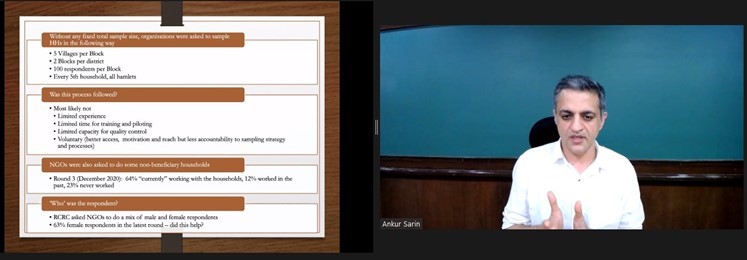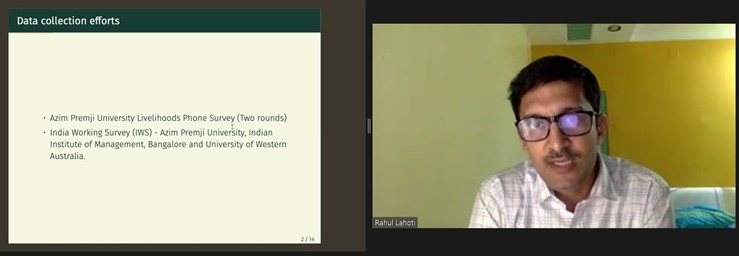Employment Decline and Recovery during the Pandemic
The NCAER National Data Innovation Centre (NDIC) held a seminar on “Employment Decline and Recovery during the Pandemic”, on October 7, 2021. This webinar was the fourth in a series of thought-provoking discussions on research methodologies organised by NDIC, in which distinguished speakers in the field share their views. The participants in the discussion included Sonalde Desai, NCAER and the University of Maryland; Ankur Sarin, Indian Institute of Management, Ahmedabad; Rahul Lahoti, ETH, Zurich and Azim Premji University; and Kaushik Krishnan, Centre for Monitoring Indian Economy. Santanu Pramanik, Senior Fellow and the Deputy Director of the National Data Innovation Centre at NCAER, moderated the session.
Over the last 18 months, the pandemic has taken its toll on the lives and livelihoods of individuals around the globe. Unfortunately, the social distancing requirements have also made it difficult for us to measure the impact of this catastrophe. The speakers in this webinar represented research projects with diverse goals and methodologies; a conversation among them is designed to understand the employment impact of the pandemic and recovery using different methods of data collection. This enriching discussion offered a unique opportunity for exploring the short- and long-term economic effects on different segments of the Indian population from a holistic perspective.
 Sonalde Desai presented on “Employment Vulnerability during the Pandemic”.
Sonalde Desai presented on “Employment Vulnerability during the Pandemic”.
Desai is a Distinguished University Professor at the University of Maryland and Professor at NCAER, and Director of NCAER’s National Data Innovation Centre. She is a demographer whose work deals primarily with social inequalities in developing countries, focusing on gender and class inequalities in human development. She leads the India Human Development Survey and has been elected as the President of the Population Association of America for 2022.
 Ankur Sarin spoke on “Vulnerabilities in Rural India: Surveys by Field-based Organisations”.
Ankur Sarin spoke on “Vulnerabilities in Rural India: Surveys by Field-based Organisations”.
Sarin is an Associate Professor at the Indian Institute of Management Ahmedabad. A shared theme in his research is attention to the consequences of inequalities and instruments used to counter them. These include public policies, social enterprises, and movements. In his recent work, he has tried to use field-based research to study and facilitate the fulfilment of policy obligations to citizens, especially children. He holds a Ph.D. (Public Policy) from the Harris School of Public Policy, University of Chicago, and a BA (Economics), Bates College.
 Rahul Lahoti presented on “Lessons and Challenges from Measuring Employment and Incomes during the Pandemic.”
Rahul Lahoti presented on “Lessons and Challenges from Measuring Employment and Incomes during the Pandemic.”
Lahoti is a researcher at ETH, Zurich, and Faculty Fellow at Center for Sustainable Employment, Azim Premji University. His research focuses on gender, labour markets, poverty, and inequality. He was involved in three phone surveys during the pandemic and has analysed secondary data to understand the distributional impacts of the pandemic on employment and income. He holds a Ph.D. from the University of Göttingen, Germany, and a Master’s in Public Administration from Columbia University, New York.
 Kaushik Krishnan presented on “Employment during the lockdowns as captured by the Consumer Pyramids Household Survey (CPHS)”.
Kaushik Krishnan presented on “Employment during the lockdowns as captured by the Consumer Pyramids Household Survey (CPHS)”.
Krishnan works in the Household Survey division of CMIE. His primary responsibility is to deliver record-level data from the Consumer Pyramids Household Survey to researchers. He holds an LLM and Ph.D. in Economics from UC Berkeley.






 Sonalde Desai presented on “Employment Vulnerability during the Pandemic”.
Sonalde Desai presented on “Employment Vulnerability during the Pandemic”. Ankur Sarin spoke on “Vulnerabilities in Rural India: Surveys by Field-based Organisations”.
Ankur Sarin spoke on “Vulnerabilities in Rural India: Surveys by Field-based Organisations”. Rahul Lahoti presented on “Lessons and Challenges from Measuring Employment and Incomes during the Pandemic.”
Rahul Lahoti presented on “Lessons and Challenges from Measuring Employment and Incomes during the Pandemic.” Kaushik Krishnan presented on “Employment during the lockdowns as captured by the Consumer Pyramids Household Survey (CPHS)”.
Kaushik Krishnan presented on “Employment during the lockdowns as captured by the Consumer Pyramids Household Survey (CPHS)”.